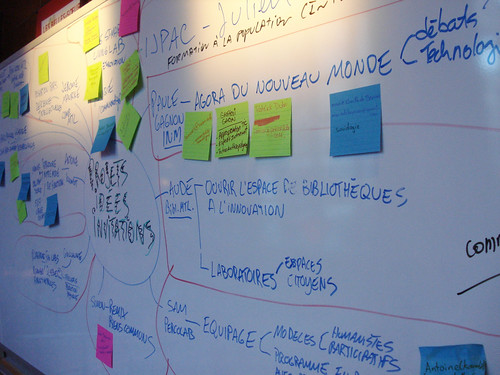What’s your million dollar idea? More importantly, what are you doing with it?
Flickr image used according to creative commons licensing by zazieÂUnfortunately, ideas generally aren’t worth the bytes they occupy without execution. Want proof? Go check out all of these ideas that are freely shared. So, why do we feel so protective of ideas that we are either ill-equipped to execute, are going to allow to die a slow painful death or worst of all tinker with until someone else finally executes?
Kevin Mullet led me down this path this week when he posed the following question on Google+
At first, I thought that there were reasonable explanations as to why people don’t share curated content, which you can see in the thread, but the more that I thought over, his initial question I wanted to dig into why people are so reluctant to share the ideas or content that they have created?
When I was a kid, my dad told me a story about his father creating “the first ATM machine concept” in the 1950’s. Of course, it was rudimentary and mechanical, but the concept was essentially there to have a machine that could dispense cash without a human interface. So, was he attributed with the invention? Did he make millions for the patent? Is his face inscribed on every Diebold machine? No, no and no. He had the idea and nothing more.
Now, with so much noise and so much data created every day, why would someone hold onto something that they can’t immediately execute? There is some covetous ownership over ideas, and I would like to better understand why people hold so tightly to ideas or creations that are never going to blossom while locked under lock and chain in the recess of their, er, our minds.
Immediately, 5 reasons jump out to me as the cause for psychology of why people don’t share ideas:
1. “Give me time, I will make this happen.” You’re never going to execute on the idea, so let someone else have a shot.
2. “I have a friend that is going to help me get this done.” You probably do not have the resources, time or money to make this idea great, so let someone else have a shot. Maybe they will partner with you to make it a success.
3. “I can’t just give it away.” If shared, this idea or knowledge product could benefit thousands of people, so let someone else have a shot.
4. “This is my work product for my company and they are going to use it eventually.” If they aren’t using it now it is going to be obsolete, replaced or never used, so let someone else have a shot.
5. “I have a lot of pride in this idea, in the hands of someone else they may destroy it.” They may or they may make something amazing, so let someone else have a shot.
Sure, there are ideas that you may execute to change your life, but I would venture to say 80% are better fit for the hands of another. It’s like love you know, “If you ‘think’ something, set it free; if it comes backs it’s yours, if it doesn’t, it never was.” 🙂
The risk is that your idea may make someone else a million dollars. The reward is that you may play a role in the meaningful impact of thousands of people. You may also add to your brand the attribution of this brilliant idea.
